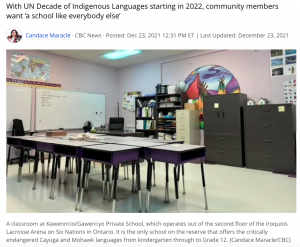
Facing History & Ourselves is a global organization that uses lessons that “challenge teachers and their students to stand up to bigotry and hate”. The website provides many resources for teachers, including lesson plans and professional development. In this search, I found a blog post written by Angela Nardozi that resonated with me titled Settler Educators Teaching Indigenous Perspectives and History. The blog identifies the role that settler educators have in the important work of teaching Indigenous Perspectives and History. She identifies three key ideas that are needed for settler educators teaching in these areas.
- Spend time remembering and unlearning your own education about Indigenous Peoples
- Listen to Indigenous peoples in terms of what they want taught
- Center Indigenous Peoples’ experiences and stories in your teaching.
My research topic includes a focus on the role of settler educators in teaching Indigenous Perspectives. I believe that these key ideas will help form some of the overall ideas needed for my final paper.
Blog post: https://facingcanada.facinghistory.org/settler-educator-teaching-indigenous-perspectives-and-history
Website: https://www.facinghistory.org/


